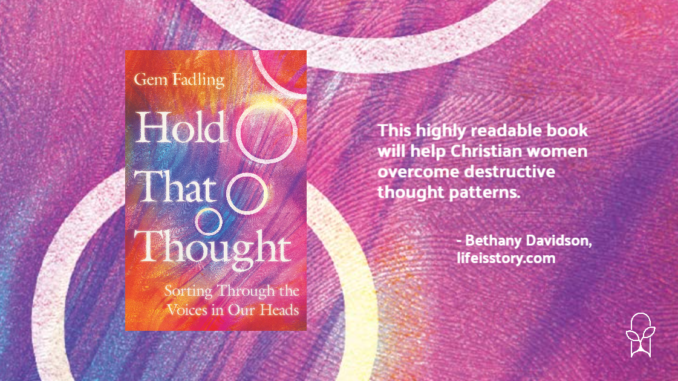
Published by IVP on September 20, 2022
Genres: Non-Fiction, Christian Life
Goodreads

"You're not good enough."
"You need to try harder."
"Everything's fine!"
These are the sorts of voices that we all have in our heads, and they often push us to act in ways that are both unhelpful and unsustainable. How do we quiet these narratives? More importantly, amid the chatter, how do we hear the voice of God?
Gem Fadling helps us identify the competing voices and shows how they hinder our personal transformation. Drawing on years of spiritual direction and leadership at Unhurried Living, she shares her wisdom of how we make sense of inner voices and settle down enough to find our true voice.
Using the discussion guide in the back of the book, groups can discuss the competing voices that they experience within their own souls and learn to notice, discern, and respond to the movement of God in their lives. When we find our true voice, we can let go of the striving and people-pleasing and rest in the presence of God and his plan for our lives.
In Hold that Thought, Gem Fadling encourages Christian women to recognize that they are more than their thoughts. She shares psychological information and spiritual wisdom to reframe common thought patterns, identifying them by names like “The Anxious Controller” and “The Positive Thinker.” She says that after years of believing her thoughts without questioning where they came from or if they were really true, she learned how to process them in a healthy way. Different chapters address different mental voices, and Fadling shares real-life stories to illustrate how she and other women have learned to overcome them.
Insight and Healing
Hold That Thought: Sorting Through the Voices in Our Heads encourages women in a down-to-earth, highly readable way. Fadling shares relatable examples of destructive thoughts, delves into many of the feelings behind them, and encourages her readers to “notice, discern, and respond” in a way that puts them in the driver’s seat of their emotional life. She provides examples of how people can turn their thoughts around by recognizing when they aren’t true, or when their response to their fear or judgment is unwise. I particularly appreciated her graceful handling of the “Complaining Victim” voice, since she addresses the faults of a woe-is-me perspective while also acknowledging that some people truly are victims and need to listen to the alarm bells in their minds.
The recommended activities and reflection questions at the end of each chapter connect spiritual beliefs and practices with everyday life, and even though Fadling encourages women to see a counselor when necessary, she provides enough insight and encouragement for many women to start the hard work of unraveling their unhealthy thinking patterns without professional help. She also consistently directs her readers’ attention to God, showing how they can draw closer to Him and better understand His love for them as they correct unruly thoughts with His truth.
Some Critiques
However, even though Fadling writes from a deeply Christian viewpoint and engages with Scripture throughout the book, I wish that she had addressed repentance as a key step in dealing with some of these thought patterns. Some of them aren’t necessarily sinful, but when someone’s reactions to life flow from issues like idolatry, selfishness, resentment of others, or self-hatred, letting go of that and experiencing God’s forgiveness is a key aspect of fully healing from it. Although she touches on a variety of biblical themes, she never shares a sufficiently clear perspective on how we can separate our suffering from our sin and deal with both rightly. I hope that in the future, she will clearly address the role repentance plays in overcoming guilt and shame.
My other critique is very minor, and just has to do with the intended audience. As I read this book, I discovered that Fadling focused on a number of common themes for women that I don’t connect with at all. These involved issues such as women feeling stifled because of their gender, struggling to understand who they are as individuals, feeling like they only matter in relationship to others, and not knowing how to use their voice. None of this is my experience at all, both because of my healthy family and church backgrounds and my assertive, vocal, opinionated personality. Fadling’s focus will be relevant and encouraging for lots of women, but if someone doesn’t relate to these themes, they will need to supply their own applications and examples.
Conclusion
I would recommend this book to women of all ages who are struggling with destructive thought patterns. Hold That Thought shares wisdom and practical advice for retraining your brain away from familiar ruts to see the world, God, and yourself in a clearer light. The author’s vulnerable personal stories and the stories she shares about other women are also helpful, especially as they articulate things that some women might feel ashamed to express without the support of learning about someone else’s experience. This book is great for personal reading, women’s book clubs, and use within therapy.
